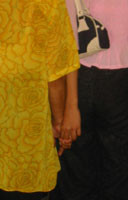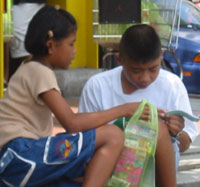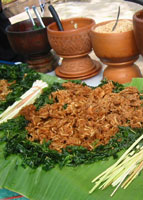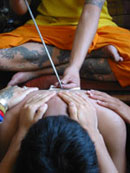Etiquette
Once upon a time I was teaching English to two Turkish girls back in the United States. Whenever they had to take an examination, I’d cross my fingers and tell them, “Good luck!” They always gave me an alarmed look and eventually gathered the courage to announce, “That means something really bad about your mother if you do that in Turkey!” It can be easy to make the largest of cultural blunders just by acting naturally within a different society and, yes, I’m still making them in Thailand.
The basic rules to behaving politely in Thailand are easy to find and also easy to pick up on through observation once you are in the country. Remove your shoes before entering a house or temple. Dress modestly. Never say anything critical regarding the monarchy or Buddhism. Don’t touch people on the head. Sounds pretty easy, right? There are other conventions followed in Thailand that are not so highly advertised or obvious even to the seasoned observer.
Let’s say that you are in Thailand and decide to hitchhike around the country. First off, this is a very uncommon practice in Thailand. Second, even if hitchhiking were commonplace in Thailand, if you were to go to the side of the road and stand with your thumb sticking up in the standard hitchhiker’s stance, no one would pick you up. Why? Because sticking your thumb up at someone is a way to show that you are angry with him or her. The correct way to beckon someone towards you, be it a waitress, friend or passing car, is to extend your arm and hand outwards with your palm facing downwards and flutter your fingers in a ‘come-hither’ action. On a side note, locking pinky fingers together with another person is a gesture of friendship and apology.
in Thailand and decide to hitchhike around the country. First off, this is a very uncommon practice in Thailand. Second, even if hitchhiking were commonplace in Thailand, if you were to go to the side of the road and stand with your thumb sticking up in the standard hitchhiker’s stance, no one would pick you up. Why? Because sticking your thumb up at someone is a way to show that you are angry with him or her. The correct way to beckon someone towards you, be it a waitress, friend or passing car, is to extend your arm and hand outwards with your palm facing downwards and flutter your fingers in a ‘come-hither’ action. On a side note, locking pinky fingers together with another person is a gesture of friendship and apology.
Another don’t in Thailand is to show public affection, particularly between opposite sexes. Although Thais in general tend to accept whatever sexuality a person chooses to express, women and men kissing, holding hands or putting arms around each other in public is frowned upon. It is entirely common, however, to see friends of the same sex, be it male or female, holding hands or locking arms around each other’s shoulders as they take a stroll. Dating rituals in Thailand have innocent qualities to them also.
public is frowned upon. It is entirely common, however, to see friends of the same sex, be it male or female, holding hands or locking arms around each other’s shoulders as they take a stroll. Dating rituals in Thailand have innocent qualities to them also.
Passing things with your left hand is another no-no. This is due to the fact that the left hand is used for matters of personal hygiene in a country where bowls of water are found in bathrooms, not toilet paper. Waving one’s hands around while speaking, speaking with arms crossed or pointing at someone with one finger are also considered to be aggressive and therefore rude gestures.
Wearing the colour black can be another big don’t as it is a colour associated with death. Modern times have seen this colour grow in popularity and acceptance, but if you are invited to a religious ceremony or wedding and show up in a gothic-looking outfit you will be viewed as bestowing bad luck on the event.
Elders are always given respect in Thailand as are other people is positions of authority. This means not arguing too strenuously with a market vendor who is clearly much older than you. It also means giving up your seat on the bus, offering to carry an elder’s bags and behaving more modestly when in the presence of your seniors.
are always given respect in Thailand as are other people is positions of authority. This means not arguing too strenuously with a market vendor who is clearly much older than you. It also means giving up your seat on the bus, offering to carry an elder’s bags and behaving more modestly when in the presence of your seniors.
Eating in Thailand carries with it other dos and don’ts. If rice is served with the meal, it is a polite gesture to first take a bite of rice (using your spoon to eat with, not your fork) as a sign that recognises rice as being the most important part of the meal. Over-ordering food at a restaurant and over-serving at home is a gesture that shows generosity. You should not finish all the food that is on the platters or your hosts will bring or order more.
Because Thais believe that the head is the most sacred part of the body because it is inhibited by the ‘khwan’ or spiritual force of life, standing over someone older or wiser is a no-no. As a sign of respect, one should lower one’s head when walking in front of someone else.
Asking someone from another culture how they beckon for a bill, count to ten on their fingers or gesture hello and goodbye can provide a few chuckles and useful knowledge, especially if you should ever find yourself in his or her country. Thailand’s moral code is much more conservative than that of the West. Because non-confrontation is a cultural cornerstone, Thais are not likely to give any sign when a visitor makes a cultural blunder. This can make figuring out a cultural blunder more difficult, but all efforts towards etiquette are enormously appreciated.
